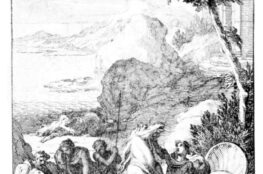Note: This suggested reading list on Catholic social teaching (CST) first appeared on the old Opus Publicum on December 3, 2013. It remains substantially unchanged, though I have added a few suggestions and modified some others. As most readers of this web-log know by now, I am a strong proponent of reading the Church’s social magisterium holistically rather than selectively. However, for the purposes of this list, I have focused on the Church’s pre-Vatican II teachings for the simple fact that they tend to be clearer and more direct than certain recent expressions of CST.
Papal Encyclicals/Declarations
Though CST has a long intellectual and doctrinal pedigree, almost nobody disputes that its modern formulation began with Leo XIII’s landmark Rerum Novarum (1891) and received a major shot in the arm with Pius XI’s Quadragesimo Anno (1931). However, it is important to also read what these and other early 20th C. popes had to say with respect to the state, civil government, and Christ’s Kingship. Two documents by Leo XIII stand out in this regard: Diuturnum (1881) and Immortale Dei (1885). Pius XI’s encyclical on the Kingship of Christ, Quas Primas (1925), should be read alongside Divini Redemptoris (1937), which contrasts atheistic communism with Catholic socio-political principles. St. Pius X’s somewhat obscure but important social encyclical, Notre Charge Apostolique (1910), condemns, on the one hand, a misdirected social movement known as Le Sillon while, on the other, reaffirming Catholic principles for the organization and prosperity of society. Another brief encyclical of Pius X, Il Fermo Propositio (1905), sets out a clear definition of Catholic Action while his motu proprio, Fin Dalla Prima Nostra, restates the principles Catholic Action must abide by. Although neither Benedict XV nor Pius XII are known for having penned any direct social encyclicals or statement, the latter pontiff addressed a broad spectrum of emerging social and moral issues throughout his reign. Pius XII, who was a longstanding member of the Vatican’s diplomatic corps and pastored the Church during the horrors of World War II, took a strong interest in applying CST to international relations, as evidenced by Summi Pontificatus (1939). Additionally, Pius XII’s landmark Mystici Corporis Christi (1943) is an essential document for understanding the nature of the Church in the modern world.
The State
In addition to primary sources such as papal documents, there is a wealth of synthesizing material out there which is rooted in not only the 19th/20th C. CST tradition, but the entire history of the Church. The indispensable manual-treatise on the state remains Fr. Edward Cahill’s Framework of a Christian State (Roman Catholic Books 2012/1932). Two more recent works which apply classic CST and political thought to the rise of liberalism and the liberal state are Christopher Ferrara’s Liberty: The God That Failed (Angelico Press 2013) and Thomas Storck’s From Christendom to Americanism and Beyond (Angelico Press 2015). Ferrara’s earlier book, The Church and the Libertarian: A Defense of the Church’s Teaching on Man, Economy, and State (Remnant Press 2010), is also worth a gander. Two shorter works, Cardinal Alfredo Ottaviani’s Duties of a Catholic State (1953) and Fr. Bede Jarrett’s The Relation of Church and State in the Middle Ages (both have been reprinted by Angelus Press), treat the topic of the state as well. Additionally, a number of pre-Vatican II manuals of moral theology and philosophy also contain relevant teachings on the state, law, and the organization of society. Two examples include Fr, Dominic Prummer’s Handbook of Moral Theology (Roman Catholic Books 1995/1957) and Fr. Henri Grenier’s Thomistic Philosophy Volume IV: Moral Philosophy (St. Dunstan Press 1948).
Social Kingship of Christ
Bound up with classic CST on the state is the doctrine of Christ’s Kingship. Though he held some questionable views on Jews and Judaism, Fr. Denis Fahey’s two-part magnum opus, The Mystical Body of Christ in the Modern World (Christian Book Club of America 1994/1939) and The Mystical Body of Christ and the Reorganization of Society (Christian Book Club of America 1995/1945), is an excellent explication of the doctrine of Christ’s Kingship. The books also provide defenses against those who have attacked this doctrine along with a comprehensive outline for how it should be put into practice in the modern world. Some of Fahey’s views are, admittedly, eccentric and reactionary, while others have become quite dated, but the core principles at the heart of the work are still relevant today. For those who don’t want to take on these two hefty volumes, numerous shorter treatments by Fahey are readily available. Some other good works on the topic include Michael Davies’ The Reign of Christ the King in Both Public and Private Life (TAN Books 1992), Archbishop Marcel Lefebvre’s They Have Uncrowned Him (Angelus Press 1994), and the Angelus Press audio-recording of its 2011 conference The Kingship of Christ. For a treatment of how the principles of Christ’s Kingship can be put into practice, Jean Ousset’s Action (IHS Press 2002) is a good place to start.
Economic History and Consequences
A great deal of classic Catholic commentary on the capitalist revolution, along with its origins and consequences, is widely available. Some good places to start include George O’Brien’s An Essay on the Economic Effects of the Reformation (IHS Press 2003), G.K. Chesterton’s The Outline of Sanity (IHS Press 2002/1927) and Utopia of Usurers (IHS Press 2002/1917), Brian McCall’s The Church and the Usurers (Sapientia Press 2013), and Amintore Fanfani’s Catholicism, Protestantism, and Capitalism (IHS Press 2002/1935). Hilare Belloc’s The Servile State (1917) (reprinted by numerous publishers) remains the quintessential polemic-prophetic work on the effects of post-Reformation economic ideology.
Economic Thought
Distributism is widely regarded as the political-economic system most compatible with CST, though it tends to remain under-theorized. The best available remedy to the problem is John Medaille’s Toward a Truly Free Market (ISI Press 2011). For a non-Distributist argument for the possibility of a market economy which does not lose sight of Christian principles, see Wilhelm Ropke’s A Humane Economy: The Social Framework of the Free Market (ISI Books 1999/1960). Other good works in the Distributist tradition with mixed reliance on economic theory include Hilaire Belloc’s An Essay on the Restoration of Property (IHS Press 2009/1937), Fr. Vincent McNabb’s The Church and the Land (IHS Press 2003/1925), and E.F. Schumacher’s classic Small is Beautiful: Economics As If People Mattered (Harper 2010/1973). Additionally, Fr. Heinrich Pesch’s solidarist economics also make for essential reading, particularly Ethics and the National Economy (IHS Press 2003) and the anthology Heinrich Pesch on Solidarist Economics (University Press of America 1998).
Miscellaneous
Since I am a firm believer in “know thy enemy,” those Catholics who want to meaningfully engage with the economic theory and ideology of libertarian/pro-liberal Catholics would do well to at least familiarize themselves with some basic concepts. Since many of these types adhere to some branch of the so-called Austrian School, a good (and cheap) place to start would be Israel Kirtzner’s recently reprinted textbook Market Theory and the Price System (Liberty Fund 2011/1963). A slightly more accessible work along these lines is Wilhelm Ropke’s Economics of the Free Society (Libertarian Press 1994/1937). For a thought-provoking takedown of modern economic theory, particularly macroeconomic theory, one should consider reading Jonathan Schlefer’s Assumptions Economists Make (Harvard University Press 2012). Another thought-provoking work, which links capitalist ideology to the contemporary criminal-justice system, is Bernard Harcourt’s The Illusion of Free Markets (Harvard University Press 2012).



